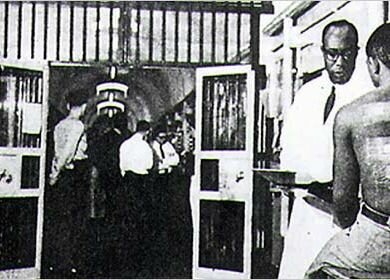Can we say “Informed consent?”
African Americans, Featured — By Kira Hudson Banks on February 8, 2010 at 03:36Informed consent is a concept that guides present day practitioners to inform participants, in research or a procedure, what they are signing up for. You are responsible for communicating your methods in a way that participants can understand so that they can make a decision about whether they want to be a part of your study.
Oftentimes, you are required to highlight the benefits and risks of being involved in the research. For example, when I am conducting research about racial discrimination, I suggest that benefits of being a part of the research could include reflecting on personal experience in a way that might be healing and helping to document the persistence of racism.
However, drawbacks might include some psychological distress from recalling and reflecting on negative events. Full disclosure is expected and deception is only allowed after an in-depth scrutiny. Any compensation offered must be clearly stated and be appropriate. All of these factors are reviewed before data collection can begin. Supposedly.
The recent review I read on the “Immortal Life of Henrietta Lacks” by Rebecca Skloot reminded me why I should humbly accept the frustration that often comes along with the review process. The scientific community has a long history of abusing its power. Therefore, the checks, although tedious at times, are necessary. Ms. Lacks, an African American woman, died from an aggressive cervical cancer after her cells were harvested during treatment at Johns Hopkins University. Subsequently, her cells, commonly known as HeLa, were used for medical research- namely the polio, Parkinson’s and chemotherapy.
What struck me the most when reading Ms. Lack’s story was that it did not end with her. The actions of the medical community continue to fuel mistrust. Ms. Lacks’ descendants, without offer for compensation, have been asked to contribute samples furthering the exploitation.
African Americans, in particular, have been exploited in the name of advancing science. The Tuskegee study has long been held up as a prime example- rightfully so given its longstanding atrocities. Lasting forty years and enduring changes in leadership, the racial exploitation was blatant. Black men were knowingly allowed to suffer with syphilis despite treatment being available.
Harriet Washington asserts that this experiment is merely one in a long history of egregious scientific endeavors in “Medical Apartheid.” Yet rather than being solely a book of past transgressions, it highlights a study as recent as the 1990s which injected African American youth with the dangerous drug fen-phen.
I do not believe scientists have not learned their lesson. Washington discusses the controversy of using inmates for research, and I was reminded of an article I read about prisoners being used in clinical trials. We cannot ignore the overlap here. For example, one third of African American males under the supervision of the court system and approximately 12% of this group between 20 and 30 are incarcerated.
African American men, in particular, continue to be vulnerable to medical exploits. As a psychologist who wants to minimize medical mistrust and increase help-seeking behaviors, this realization is saddening. However, we cannot expect mistrust of the health care system to diminish if we do not acknowledge wrongdoing. But it cannot stop there.
We must be willing to change course and halt our actions. The ethical underpinnings of informed consent should hold true despite the sample population, and researchers should not simply shift their attention towards new vulnerable populations in the name of scientific exploration.
Tags: African-Americans, blacks, Health, health care, inmates, medical apartheid, prison, race, Research, Talking about Race, Tuskegee experimentAuthor: Kira Hudson Banks (11 Articles)

Kira Hudson Banks, Ph.D. teaches Abnormal Psychology, Understanding Race, Psychology of Racism, Middle School Girls in Social Science and Illinois Wesleyan University. She spearheaded the GO-GIRL mentoring program to foster math and science interest among adolescent girls in the Bloomington-Normal community. She has received the community's Athena Award and the Pantagraph's "20 Under 40" honor for her local leadership. Kira earned her Ph.D. from University of Michigan.



 Share This
Share This Tweet This
Tweet This Digg This
Digg This Save to delicious
Save to delicious Stumble it
Stumble it





 Why Obama's speech betrays an important legacy
Why Obama's speech betrays an important legacy What does an illegal immigrant look like?
What does an illegal immigrant look like? The rush to judgment
The rush to judgment The quest for cohesive education policy for undocumented immigrants
The quest for cohesive education policy for undocumented immigrants







